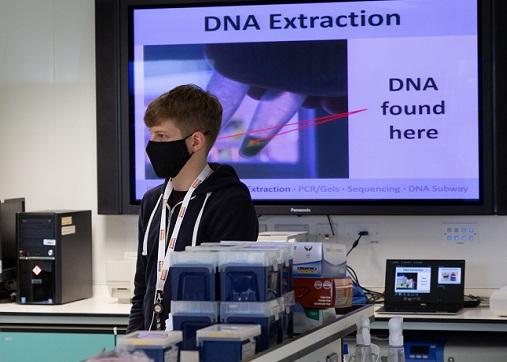As part of the pioneering UK-led Darwin Tree of Life project (DToL), the Wellcome and UKRI-BBSRC funded ‘Barcoding the Broads’ programme provides training on how to collect samples and then sequence a DNA barcode of species found in the East of England. Showcasing the modern scientific disciplines of genomics and bioinformatics, the outreach project will help more people to conserve the brimming biodiversity of our unique waterways and connect with our environment.
Could the next new species be in your own backyard? The Earlham Institute is inviting teachers, students and naturalists to get in touch to learn how you can use DNA sequencing tools to help document the wondrous natural world in Norfolk and beyond.
The Norfolk Broads is the UK’s largest protected wetland and of international importance as one of Europe's finest habitats - including a wealth of hidden biodiversity - such as saltmarshes, intertidal mudflats, shallow lakes, fens, drained marshland, wet woodland, relict estuary and coastal dunes.
DNA barcoding is an effective and straightforward method for identifying species. It involves extracting DNA from the organism followed by sequencing of the samples. Working closely with the DNA Learning Centre at Cold Spring Harbour, New York, the Earlham Institute has developed an interactive workshop to train educational professionals and naturalists in the DNA barcoding process, showing how genomics aids conservation efforts and builds awareness of biodiversity loss.
“Exploring biodiversity in Norfolk means learning more about all the living things in the place I grew up - from the seals at Horsey and the rare butterflies on the Broads, to the plants and mushrooms in local parks and the tiny pond organisms we can only see with a microscope,” said Public Engagement Officer at the Earlham Institute, Dr Sam Rowe. “I hope this programme will help others to connect with the region’s awe-inspiring nature through our DNA barcoding activities.”
The Barcoding the Broads ‘train-the-trainer’ approach allows participants to transfer the knowledge and skills gained in the workshops and activities through the national curriculum at secondary schools and sixth-form, as well as surveying work carried out by nature groups - specifically engaging young people (13-19 yrs old) as well as the general public in STEMM subjects.
The full-day workshop provides an introduction to the project as well as hands-on activities that cover the lab and computer techniques for DNA barcoding, starting with an exploration of plants on the Norwich Research Park - with the opportunity to discuss how DNA barcoding can be incorporated into your educational work or local research project, and how the Earlham Institute can support this.
The programme will enable participants to get involved in online activities and public events that advocate citizen science - taking an active approach in exploring and supporting our natural environment through local initiatives.
“Ultimately, we’re aiming to empower people to become citizen scientists and provide opportunities to learn about a huge range of exciting topics in biology and chemistry such as biodiversity, ecology, climate change, bioinformatics and genomics,” said Dr Sam Rowe.
Barcoding the Broads is part of the national DToL project, which aims to sequence the genomes of all eukaryotic organisms in Britain and Ireland to support the understanding, conservation and benefit of our natural environment. The local programme, led by the Earlham Institute, aims for DNA barcoding training to be adopted by schools and nature groups across the country to identify existing and newly found species.
Dr Rowe explains: “We hope the DNA barcoding training will enhance local networks of amateur naturalists and inspire future scientists through our connections with educational institutes - with the scheme being rolled-out across the UK to broaden our impact and help create a sustainable, positive change in attitudes towards protecting and advocating our environment.
“By forming strong links between local educational partners, nature enthusiasts and the UK-wide DToL project, we will give Norfolk a real stake in this important area of research. Local citizen scientists, for example, may identify completely new or rare species through the DNA barcoding work. If the data is of high-enough quality, this could not only directly feed into the DToL sequencing project but also contribute to its umbrella Earth BioGenome Project, and other global sequencing efforts such as the European Reference Genome Atlas.”
Please get in touch if you would like to find out more about the Earlham Institute’s Barcoding the Broads initiative - offering training to communities such as sixth form teachers/technicians, local naturalist groups, science communicators or other education professionals.
[[{"fid":"295929","view_mode":"default","fields":{"format":"default","alignment":"","field_file_image_alt_text[und][0][value]":"Barcoding the Broads logo","field_file_image_title_text[und][0][value]":"Barcoding the Broads logo"},"link_text":false,"type":"media","field_deltas":{"1":{"format":"default","alignment":"","field_file_image_alt_text[und][0][value]":"Barcoding the Broads logo","field_file_image_title_text[und][0][value]":"Barcoding the Broads logo"}},"attributes":{"alt":"Barcoding the Broads logo","title":"Barcoding the Broads logo","class":"media-element file-default","data-delta":"1"}}]]
